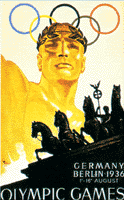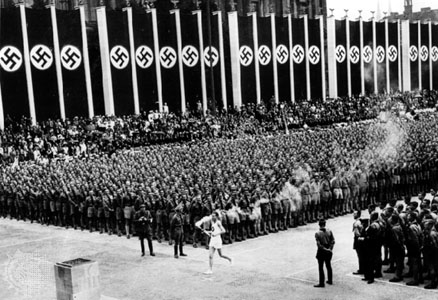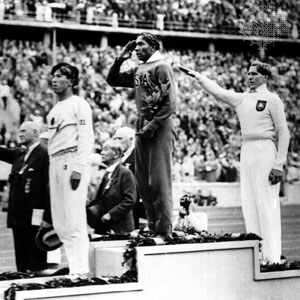HISTORY OF THE MODERN OLYMPICS
Berlin, Germany, 1936
 |
| Olympic posters from the Archives, Olympic Museum Lausanne, from the book The Olympic Spirit, published by Tehabi Books |
Adolf Hitler and the Nazi Party viewed the Olympics as an opportunity to advance Nazi ideology. Pamphlets and speeches about the natural superiority of the Aryan race were commonplace. The Reich Sports Field, a newly constructed sports complex that covered 325 acres (131 hectares) and included four stadiums, was draped in Nazi banners and symbols.
 |
| A runner carrying the Olympic torch into the Reichssportfeld to light the Olympic flame during the opening ceremonies of the 1936 Olympics in Berlin |
| UPI/Corbis-Bettmann |
The Berlin Olympics featured advancements in media coverage. It was the first Olympic competition to use telex transmissions of results, and zeppelins were used to quickly transport newsreel footage to other European cities. The Games were televised for the first time, transmitted by closed circuit to specially equipped theatres in Berlin. The 1936 Games also introduced the torch relay.
 |
| Jesse Owens (centre) standing on the winners' podium after receiving the gold medal for the running broad jump (long jump) at the 1936 Olympics in Berlin. |
| AP/Wide World |
However, the Germans did win the most overall medals, dominating the gymnastics, rowing, and equestrian events. Hendrika "Rie" Mastenbroek of The Netherlands won three gold medals and a silver in the swimming competition. Basketball, an Olympic event for the first time in 1936, was won by the U.S. team. Canoeing also debuted as an Olympic sport.
The 1940 and 1944 Games, scheduled for Helsinki (originally slated for Tokyo) and London, respectively, were canceled because of World War II.
Introduction * Early History * Revival of the Olympics * Organization of the Modern Games